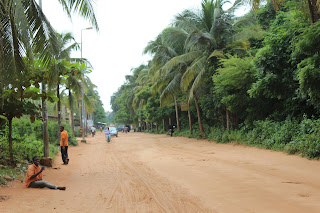Although I did spend the majority of my time being sick last weekend, I did also get a chance to head out to the city of Lokossa and Lake Possotomè on a day trip with my host dad, Melissa, and Aristotle. It was surprisingly fun despite not feeling so well.
 |
| Me posing for a rare picture in the walkway to the restaurant on Lake Possotomè. |
Boy, have things ever flown by fast eh? Here we are in the middle of July, halfway through my 10th week in Benin and already the 8th edition of this post. For things I learned points 70 – 80, I was as not as stretched to find as you might think, there always seems to be something new to learn. So here is my collection from the past week:
 |
| Delicious slice of birthday cake for Mama's birthday. Iced cake is significantly more expensive here compared to other food, but they personalize the icing and it was scrumptious! |
So, as some of you might already know, there’s been a combination of reasons why I haven’t posted a blog in more than a week now. Firstly, the internet connection has been down in Ouidah since that big storm about two weeks ago that I mentioned in my previous TTILTW post. The internet only returned yesterday. In the meantime, I had to make do with my cellphone internet, which is only reliable enough to use facebook and google (my previous posts I put up during a trip to Cotonou). Secondly, that trip I took to Cotonou was to the hospital because I was feeling sick. I had learned that I had malaria, along with, um, digestive track issues caused by a bacterial infection. Needless to say, it was tough, but I also learned a lot from the experience so let’s not delay:
This week, I had to think hard about what to include and what not to include. It was a week full of travel and sightseeing, new experiences and lessons. I am now more than halfway through my trip to Benin. I hope you enjoy this edition!
 |
| One of the roads in the expansive university campus. |
The veil of opaque water trembled as our guide’s paddle made contact with its static surface. I watched in silence as the ripples began to augment, soon lapping at the side of our wooden canoe and rocking it ever so slightly. Above us, the tattered cloth tied to a wooden pole that served as our makeshift sail also did its part to carry us ever so closer to what has been called the Venice of West Africa: Ganvié, the Beninois village of about 30,000 people – built entirely on water.
 |
| One of our guides steering on our way to Ganvié. |
 |
| The city approaches. |
 |
| Here, a young Ganviéan demonstrates both sleeping and working on the water. |
The endless blaring of horns. Fumes from a moto that just barely missed your arm as it whizzed by. Claustrophobia as you realize you can’t step aside for the girl with a basket of fish on her head because the man holding wooden statues in his hands to your right is backed up by a group of children selling cookies and a woman bartering with a merchant in front. Squinting to avoid getting the dust that perpetually blows through the market in your eyes. Being constantly convinced that I need a new belt, a bar of soap, a baggie of peanuts, a keychain, Gucci underwear, or something neither I nor the vendor know the exact purpose of.
 |
| It's difficult to get a picture of the market as a whole because of the risk of taking out your camera. This fruit market wasnt as densely populated. |
I gripped the chalk, a grain about half the size of the nail on my pinkie finger, and about as thick – tightly between my thumb and forefinger. My hand trembled slightly as I raised my hand up to the smooth wooden chalkboard. It leaned against the wall behind me and rested perilously upon a wooden bench opposing another one of the same, upon which sat my first ever class of students. Eight pairs of eyes stared up at me eagerly: some familiar, some not, and all clearly waiting upon my next words of instruction. Each of them had already flipped to a fresh page in their books, pen or pencil at the ready. I turned to face the board, and began to write, a shadow of chalk powder trailing my fingers as I sketched out the letter “E”. And so it began.





